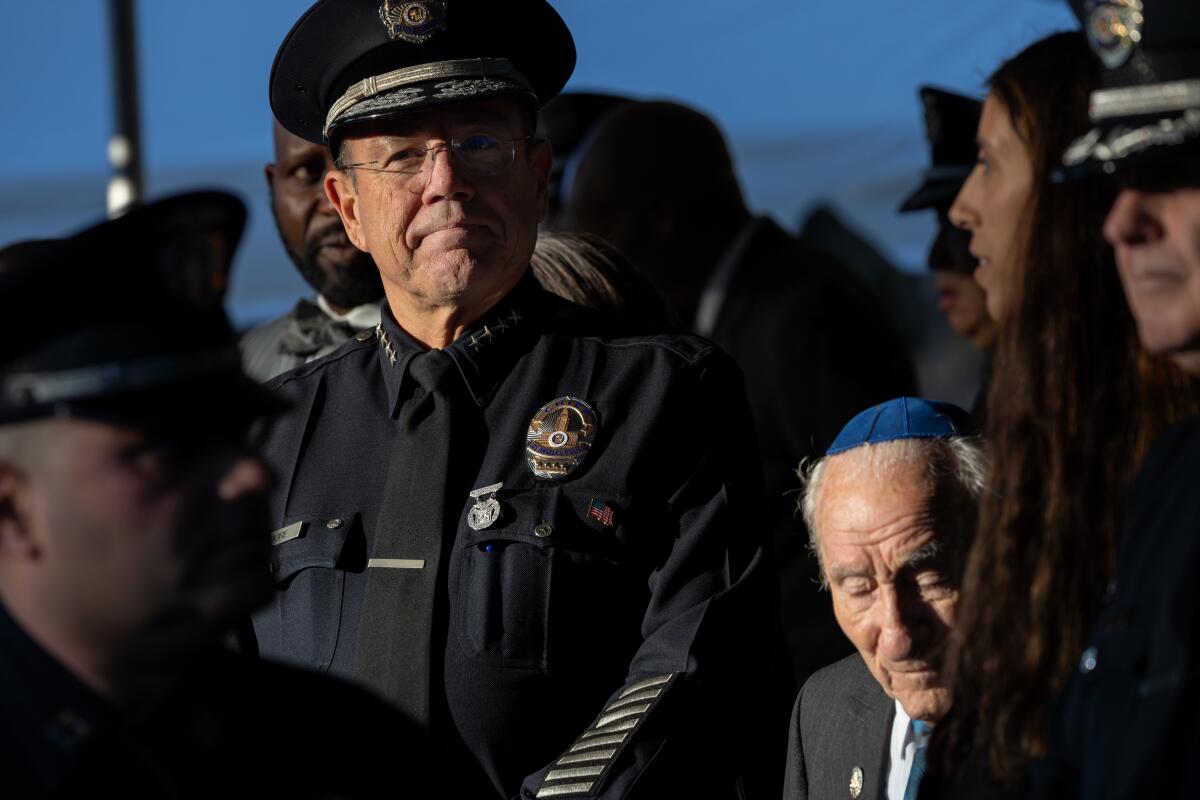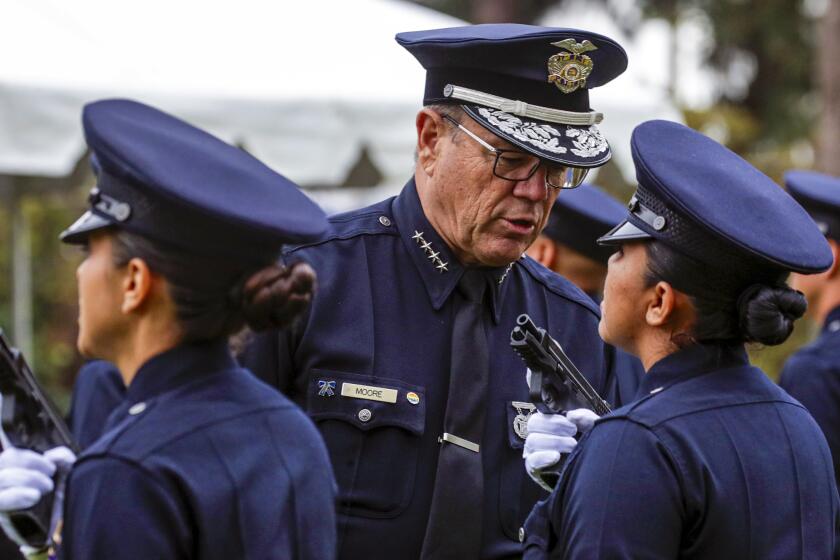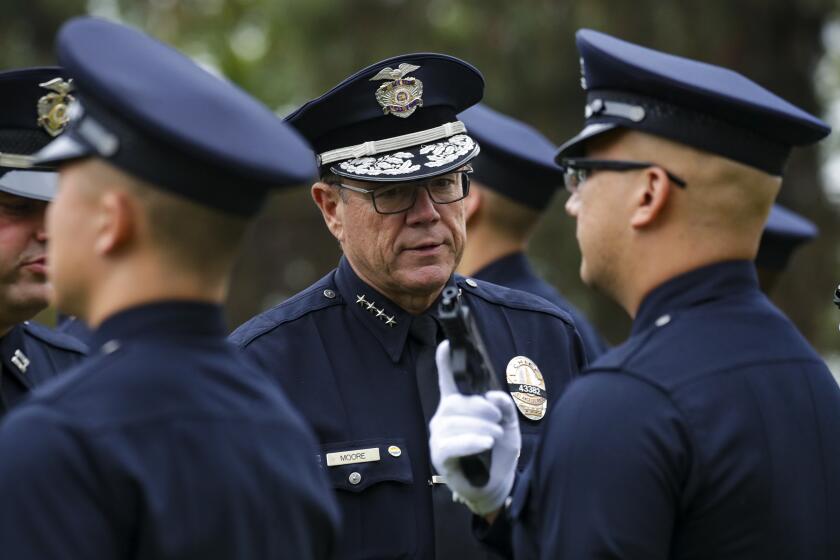Prosecutors fear LAPD gang unit scandal could jeopardize over 300 cases, sources say

- Share via
With criminal charges looming against the officers at the center of the Los Angeles Police Department’s latest corruption scandal, county prosecutors have started a broad review of hundreds of cases that rely on testimony or evidence from at least two members of a gang squad suspected of making illegal stops and stealing items from suspects, according to multiple law enforcement sources.
The sources, who spoke on the condition of anonymity to discuss deliberations within the Los Angeles district attorney’s office, said as many as 350 criminal cases have been identified as potentially compromised.
Prosecutors will have to weigh whether they have enough evidence to proceed with pending cases, while also potentially revisiting prior convictions or guilty pleas that hinged on the testimony of officers tainted by the scandal.
District attorney spokeswoman Tiffiny Blacknell confirmed that the LAPD has sent the results of its investigation into two Mission gang unit officers to the district attorney’s office, which will decide whether to file charges.
The LAPD has said at least 15 officers are involved in the still-unfolding investigation, but the department has declined to name them, citing confidentiality around personnel matters. Two officers have been sent to face a disciplinary panel called a board of rights, indicating the department is seeking to terminate them, although it’s unclear whether these are the same two officers facing potential criminal charges.
The remaining officers from the unit have been assigned home or placed on restrictive duties that take them off the streets, according to the department.
Depending on how many of those 15 are eventually swept up in the scandal, the fallout could be significant. Thousands of existing criminal cases — including some involving suspected gang members facing serious charges — could be jeopardized, according to two law enforcement sources who could not speak freely because the probe remains ongoing.
A string of recent controversies have put to a test LAPD Chief Michel Moore’s quest to get his department into shape before stepping down in the next year or two.
Legal experts say prosecutors may have trouble obtaining convictions in cases that rely too heavily on officers who are accused of criminal conduct, including theft. Those cases would likely fall apart, experts said, unless the underlying investigations include evidence beyond the testimony of officers whose credibility is now being called into question.
It was not immediately clear whether defendants in the cases under review have been notified. In past instances in which officers have been accused of wrongdoing, the district attorney’s office sent letters to defendants whose cases listed one or more of the accused officers as potential witnesses, urging a response if they felt their involvement was prejudicial or merited further review.
In the Mission case, the department announced previously that a months-long internal affairs investigation uncovered evidence that members of the division’s gang enforcement detail illegally stopped people and stole from them, while routinely turning off their body cameras to avoid being caught. The FBI is also investigating the unit for potential constitutional violations.
Authorities believe that in one instance an officer drew a gun on a person who had been stopped and took the person’s property, according to two law enforcement sources who requested anonymity to discuss the ongoing investigation.
One source described the item as a knife with brass knuckles as its handle. Prosecutors have debated, the sources said, about whether to charge the officer with robbery, which is defined as as the taking of property with the use or threat of force, rather than theft.
An LAPD detective filed a legal claim against the city alleging sexual abuse in the locker room of the department’s football team.
Prosecutors and some of the LAPD’s own investigators have raised questions about whether the department’s initial probe was too limited in its scope, according to a source briefed on the case who was not authorized to speak publicly.
Internal affairs investigators obtained warrants to search the work lockers of the officers under suspicion, but a request to search their homes for additional evidence was denied, according to sources briefed on the matter. Some inside LAPD’s internal affairs unit expressed concern that the officers under suspicion were being allowed to get rid of incriminating evidence, the sources said.
The allegations against the Mission officers have shaken the department, evoking past controversies involving other specialized units that committed misconduct in the name of fighting crime.
In a briefing at Tuesday’s Police Commission meeting, LAPD Chief Michel Moore said he wanted to let the investigations play out before commenting further.
“I will not project or guess the number of charges and the outcomes of this; I’ll wait for the investigation and I’ll look forward to the prosecuting agencies making those determinations,” he said.
The D.A.’s sweeping case review is the latest in a string of embarrassing scandals under Moore, including senior officials accused of engaging in inappropriate relationships with subordinates, and the inadvertent release of hundreds of photos of undercover officers.
Department observers say the recent incidents have renewed questions about management and oversight of the nation’s third-largest police department.
Moore has previously denied that an underlying pattern of problematic behavior exists within the department, saying a broad review he ordered in the wake of the Mission allegations “found no evidence” that similar acts of misconduct extended to other units. The inspector general’s office is conducting its own review.
Internal LAPD reports indicate the problem of police officers flouting department body camera policy is more widespread than officials have been telling the public.
In a statement released by the department after this article was initially published, LAPD officials said they found that the Mission gang unit’s members had produced 108 arrest reports “during the pertinent time frame.” Of those, 13 reports “may have inconsistencies between the video evidence and the written report,” the release said.
“In addition to the Office of the Inspector General’s oversight, I receive frequent briefings on the status and direction of the ongoing investigation,” Moore said in the statement. “I am highly confident that Internal Affairs Division investigators are rigorously pursuing the truth without constraint.”
An internal report reviewed by The Times found that officers in other divisions were also flouting the policy, turning off their cameras in violation of department rules.
One possible explanation for these lapses, the report said, is a “real perception” that officers are “somehow excused” from turning on their cameras in time to capture encounters with the public if they can articulate a clear reason for not doing so.
Some supervisors are under the impression that they are required to review body camera footage only in a narrow set of situations, the report said.
Moore addressed the matter in an order issued earlier this month, clarifying that supervisors can review their officers’ camera footage whenever they want.
On Tuesday, Moore said the department’s review found “a lack of consistent understanding about our supervisors’ ability to review body-worn video.” He said some of the issues will be addressed through the modernization of the department’s record-keeping systems, which will “let people know that such a gaming of the system will not be allowed and that they’ll be caught.”
The alleged Mission misconduct came to light through an internal investigation of a traffic stop in December, when a motorist claimed police pulled him over and searched his vehicle without consent or probable cause.
The department’s inquiry widened when investigators began to review other stops carried out by the unit, finding numerous instances in which officers had improperly switched off their body-worn cameras or otherwise failed to document the encounter, in violation of department policy.
More to Read
Sign up for Essential California
The most important California stories and recommendations in your inbox every morning.
You may occasionally receive promotional content from the Los Angeles Times.


















